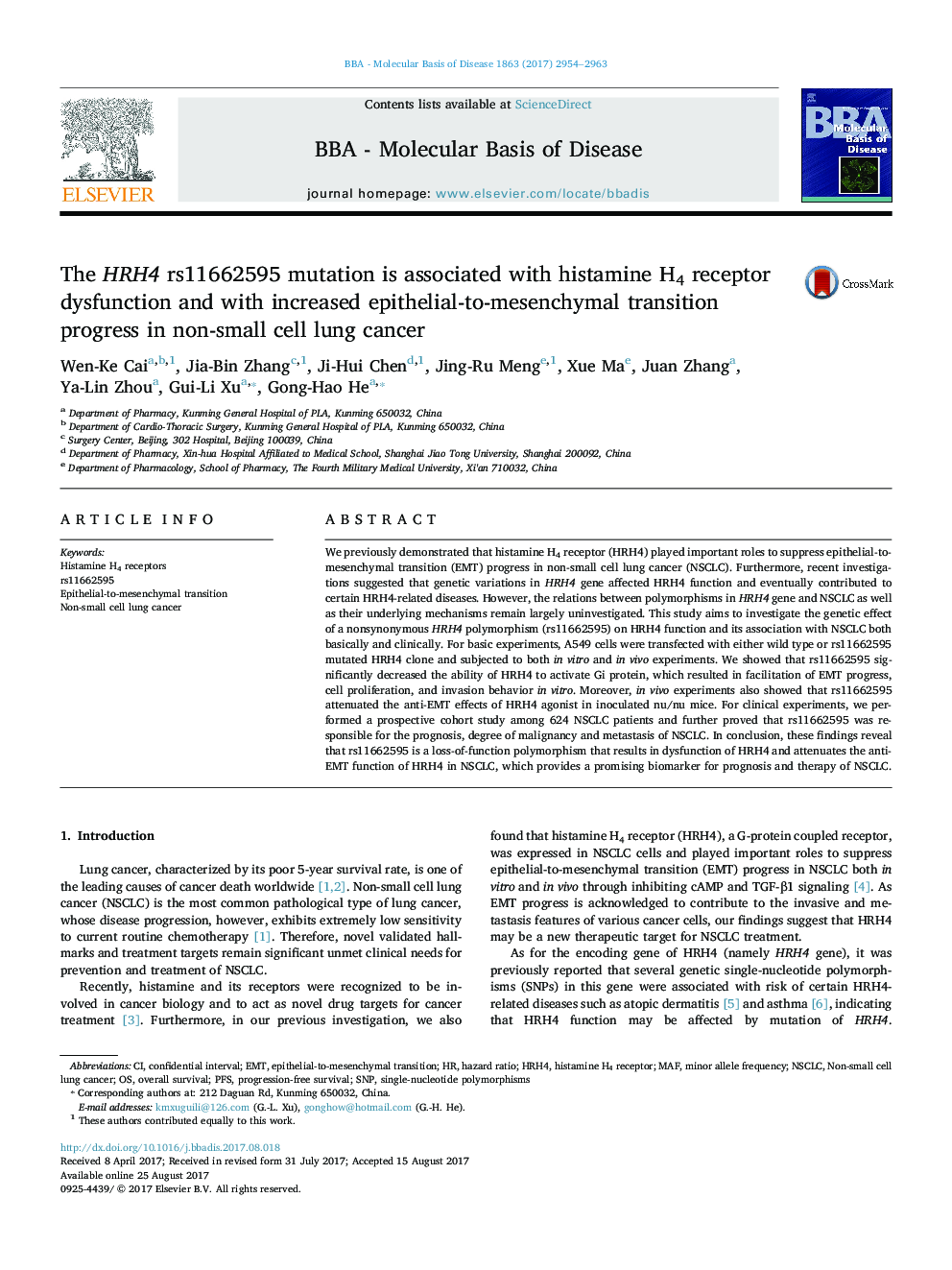| کد مقاله | کد نشریه | سال انتشار | مقاله انگلیسی | نسخه تمام متن |
|---|---|---|---|---|
| 8258902 | 1534615 | 2017 | 10 صفحه PDF | دانلود رایگان |
عنوان انگلیسی مقاله ISI
The HRH4 rs11662595 mutation is associated with histamine H4 receptor dysfunction and with increased epithelial-to-mesenchymal transition progress in non-small cell lung cancer
دانلود مقاله + سفارش ترجمه
دانلود مقاله ISI انگلیسی
رایگان برای ایرانیان
کلمات کلیدی
MAFHistamine H4 receptorsPFs - PF هاprogression-free survival - بقا بدون پیشرفتoverall survival - بقای کلEMT - تکنسین فوریتهای پزشکیNSCLC - سرطان ریوی غیر سلول کوچکNon-small cell lung cancer - سرطان غیر سلول کوچک ریهminor allele frequency - فراوانی آللی جزئیconfidential interval - محدوده محرمانهhazard ratio - نسبت خطرSingle-nucleotide polymorphisms - پلیمورفیسم تک نوکلئوتیدیSNP - چندریختی تک-نوکلئوتیدepithelial-to-mesenchymal transition - گذار اپیتلیال به مزانشیمالHistamine H4 receptor - گیرنده H4 هیستامینین
موضوعات مرتبط
علوم زیستی و بیوفناوری
بیوشیمی، ژنتیک و زیست شناسی مولکولی
سالمندی
پیش نمایش صفحه اول مقاله

چکیده انگلیسی
We previously demonstrated that histamine H4 receptor (HRH4) played important roles to suppress epithelial-to-mesenchymal transition (EMT) progress in non-small cell lung cancer (NSCLC). Furthermore, recent investigations suggested that genetic variations in HRH4 gene affected HRH4 function and eventually contributed to certain HRH4-related diseases. However, the relations between polymorphisms in HRH4 gene and NSCLC as well as their underlying mechanisms remain largely uninvestigated. This study aims to investigate the genetic effect of a nonsynonymous HRH4 polymorphism (rs11662595) on HRH4 function and its association with NSCLC both basically and clinically. For basic experiments, A549 cells were transfected with either wild type or rs11662595 mutated HRH4 clone and subjected to both in vitro and in vivo experiments. We showed that rs11662595 significantly decreased the ability of HRH4 to activate Gi protein, which resulted in facilitation of EMT progress, cell proliferation, and invasion behavior in vitro. Moreover, in vivo experiments also showed that rs11662595 attenuated the anti-EMT effects of HRH4 agonist in inoculated nu/nu mice. For clinical experiments, we performed a prospective cohort study among 624 NSCLC patients and further proved that rs11662595 was responsible for the prognosis, degree of malignancy and metastasis of NSCLC. In conclusion, these findings reveal that rs11662595 is a loss-of-function polymorphism that results in dysfunction of HRH4 and attenuates the anti-EMT function of HRH4 in NSCLC, which provides a promising biomarker for prognosis and therapy of NSCLC.
ناشر
Database: Elsevier - ScienceDirect (ساینس دایرکت)
Journal: Biochimica et Biophysica Acta (BBA) - Molecular Basis of Disease - Volume 1863, Issue 11, November 2017, Pages 2954-2963
Journal: Biochimica et Biophysica Acta (BBA) - Molecular Basis of Disease - Volume 1863, Issue 11, November 2017, Pages 2954-2963
نویسندگان
Wen-Ke Cai, Jia-Bin Zhang, Ji-Hui Chen, Jing-Ru Meng, Xue Ma, Juan Zhang, Ya-Lin Zhou, Gui-Li Xu, Gong-Hao He,